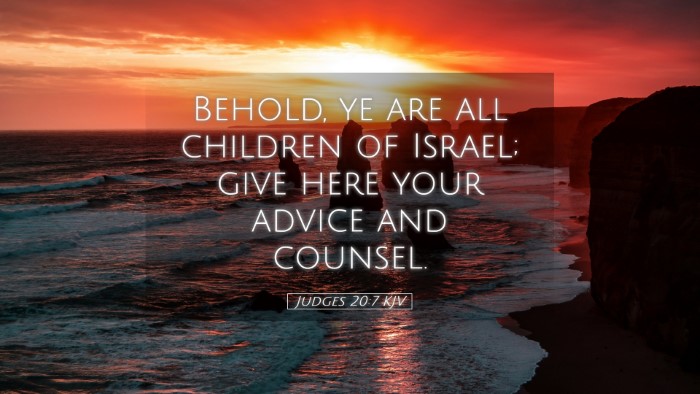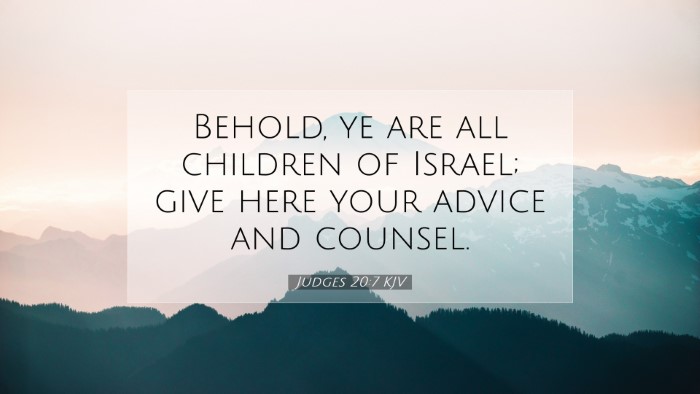Commentary on Judges 20:7
Bible Verse: Judges 20:7 - "Behold, ye are all children of Israel; give here your advice and counsel." (KJV)
Introduction
The verse under consideration occurs in the context of a significant civil conflict within Israel. It highlights the leadership and decision-making process among the tribes of Israel following a grievous crime committed in Gibeah. The urgency for counsel is indicative of a society grappling with moral decay and seeking justice.
Contextual Analysis
Matthew Henry elaborates that this statement is made by the leaders of Israel who convene to address the sin committed in Gibeah. This passage comes at a pivotal moment where the tribes must unite to respond to the atrocities that threaten their communal integrity. The tone here conveys a democratic approach to leadership, wherein every tribe is invited to contribute to the deliberation of justice.
Leadership and Accountability
Henry writes about the importance of leaders in Israel being accountable to God and the people they serve. In times of crisis, the ability to convene for collective decision-making reflects the value placed on community and shared responsibility.
Unity among Tribes
Albert Barnes notes that this call for counsel reflects a significant moment of unity among the tribes of Israel. Despite the prevailing tensions, the leaders recognize their shared identity and obligation to one another. This is crucial for a nation or people to withstand internal strife, emphasizing the strength derived from unity.
The Need for Righteous Judgment
Both Henry and Clarke discuss the moral imperative behind the inquiry. The leaders sought not mere opinions but wisdom consistent with God’s covenant. There is an acknowledgment that without divine guidance, their decisions could lead to further chaos. As they search for advice and counsel, it is a plea for godly wisdom in everything they seek to resolve.
Theological Implications
This episode in the Book of Judges serves as a reminder to modern readers and scholars about the characteristics of godly leadership. Here, we discern important qualities:
- Inclusiveness: All voices are necessary in the quest for justice.
- Accountability: Leaders must answer to their constituents and to God.
- Moral Clarity: The need for divine guidance in decision-making is paramount.
The Call for Divine Wisdom
Adam Clarke emphasizes the notion that human wisdom is insufficient for righteous judgment. The leaders’ appeal isn't just logistical but spiritual, indicating that without God’s input, they risk perpetuating their errors and injustices. This principle holds immense theological weight: the need for divine insight in all matters, especially those that touch the heart of community and justice.
Practical Applications
For pastors and theologians, the cry for "advice and counsel" resonates today. The church must regularly seek collective input in matters pertaining to justice, community welfare, and moral standards.
- Encouraging Participation: Foster an environment where all voices are encouraged in church governance.
- Promoting Prayer: Prioritize prayer for divine guidance in church decision-making.
- Addressing Community Issues: Engage congregants in discussions about pressing local issues, reflecting communal responsibility.
Conclusion
Judges 20:7 symbolizes a critical juncture for Israel, speaking to themes of leadership, unity, and the necessity of seeking God’s wisdom. As current believers reflect on this passage, they are reminded of their responsibilities both to God and to each other within the community of faith.


